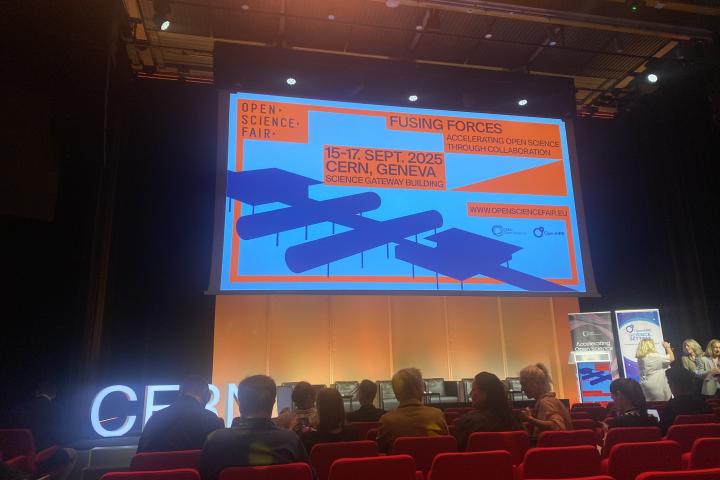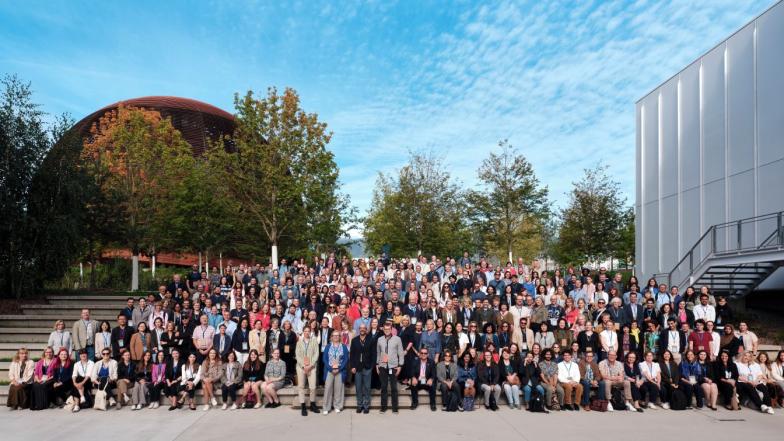UCT eResearch at Open Science Fair 2025

The Open Science Fair 2025, held at CERN in Geneva from 15-17 September, brought together researchers, analysts, and policymakers to discuss current developments and challenges in open science. The UCT eResearch team in attendance were Director Prof Mattia Vaccari and Analyst Sarah Schafer, who joined a growing community of Open Science practitioners from around the globe.

The event brought together presenters and participants from diverse sectors, including government and intergovernmental organisations, NGOs, industry, universities and publishers. Attendees included policymakers, funders, repository managers, librarians, content and service providers, research administrators, citizen science initiatives, and innovators in scholarly communication. This diversity highlights the multifaceted nature of open science, spanning academia, public institutions, industry, intergovernmental bodies, and community-driven projects, all focused on transparency, reproducibility, and research infrastructure.
CERN is recognised for its commitment to openness in research, which spans over 70 years, dating back to its founding principles established with the signing of the CERN Convention at UNESCO in 1952. From its inception, open science has been a core value of CERN, emphasising transparency and accessibility in research for the benefit of science and society. Being at CERN carried symbolic and practical significance for this gathering, especially at a time of such global instability.
The opening keynote, “Re-imagining Scientific Culture in a Changing World”, was delivered by Prof Alexa T McCray, a professor at Harvard Medical School and a leader in biomedical informatics. She explored how scientific practices have evolved alongside societal changes throughout history, and emphasised the importance of adapting scientific culture to meet contemporary societal challenges responsibly and inclusively.
Several panel discussions addressed pressing topics in open science policy, research infrastructure and research assessment. One invited panel titled “Shaping the Future: The Policy Landscape of Open Science” examined current policy shifts, challenges, and opportunities shaping open science implementation, and other panels focused on publishing models, platforms advancing equitable open access, and developing Open Science communities.
Presenters and panellists discussed aligning national and international policies to empower institutions in fostering openness with a focus on equity and inclusivity. Despite these commitments, global representation, especially from the Global South, was limited and not prominently featured in the programme. This highlights ongoing challenges in ensuring open science initiatives fully reflect diverse perspectives and address structural inequalities in global research collaborations.
CERN’s role in the global Open Science movement is pivotal not only through its pioneering research but also by its significant contributions to open source tools that underpin scientific collaboration and transparency. One such tool is InvenioRDM, a turnkey research data management platform developed at CERN that supports the storage, curation, and open dissemination of research outputs. The platform was featured and demonstrated, showcasing its role in promoting open, transparent, and well-managed data. Zenodo, built on InvenioRDM, provides an open-access repository for researchers worldwide to share and preserve their outputs easily and securely. Notably, eResearch is a recipient of the CERN-South Africa Knowledge Transfer Programme, and the team had the opportunity to engage directly with the InvenioRDM team at CERN.
Dr. Christopher Steven Marcum delivered the closing keynote, reflecting on collective intelligence and the need for integrated policy frameworks and robust data governance. Marcum emphasised the power of global, international, and cross-regional collaborations in advancing open science and highlighted how diverse partnerships across borders, disciplines, and institutions can accelerate discovery, enhance knowledge accessibility, and foster a transparent and equitable research ecosystem. Marcum’s address underscored the importance of genuine human collaboration amid the growing emphasis on artificial intelligence, advocating for a scientific community united in shared goals and mutual support to co-create the future of open science.
Recordings from presentations and materials from the event are all available on Zenodo at https://zenodo.org/communities/opensciencefair2025, providing open access to the content shared.
